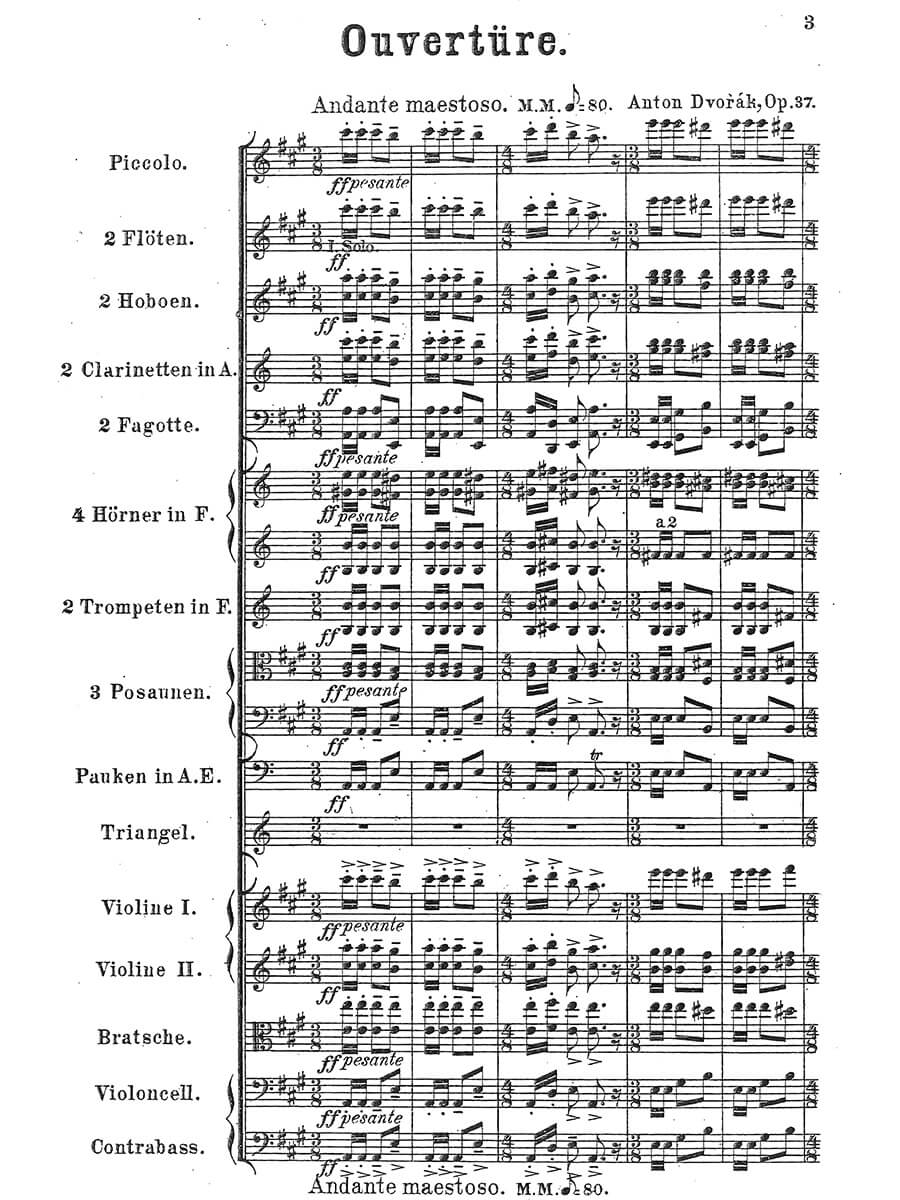The Cunning Peasant Op. 37, overture
Dvorák, Antonín
23,00 €
Preface
Antonín Dvořák
(b. Mühlhausen, 8. September 1841 – d. Prag, 1. Mai 1904)
The Cunning Peasant (Šelma sedlák), op. 37, JB 67
Overture
Preface
Antonín Dvořák began writing his new two-act opera The Cunning Peasant in 1877, and the whole work took him only about six months (from February to July 1877). As soon as the opera was finished, Dvořák submitted it to the Provisional Theatre in Prague for staging. The libretto as well as the composed opera were inspired by Smetana’s success of his comic opera The Kiss (Hubička) and in particular by Smetana’s iconic Bartered Bride (Prodaná nevěsta). In Dvořák’s career as an opera composer so far, The Cunning Peasant was his third comic opera (counting only one version of The King and Collier /Král a uhlíř/), all of them most likely influenced by Smetana’s style, i. e. the Czech national opera style (topics from the Czech village and using of attributes of Czech folk music) .
The libretto with the original title A Slap for the Prince (Políček knížeti) was written bythe young librettist Josef Otakar Veselý, with whom Dvořák had become acquainted during visits to the Academic Readers’ Club. This libretto, which capitalised on the great popularity of Smetana’s The Bartered Bride, is very naive and lacks dramatic momentum. Despite these facts, Dvořák created a mature operatic work based on a traditional numbered structure. His music is vivacious, full of his typical melodic and harmonic inventions and different types of Czech folks dances (polka, skočná /fast dance/, sousedská /slow dance in ¾ time/). Dvořák also applied his natural sense for symphonic music, which is testified by the Viennese critic Eduard Hanslick after the Viennese premiere: “The ballet movement in D minor in Act Two is more a symphonic scherzo than an operatic dance piece.”
The first performance of the opera took place at the Provisional Theatre on 27 January 1878 and was very well received, mostly because The Cunning Peasant was recognised as a continuation of the success of the Smetana legacy as was reported after the Czech premiere: “Perhaps Dvořák in this case has not yet achieved the consistency of all parts, the appropriate characteristics, and the purity and permanence of the national style that we rightly admire in the music of Smetana, nevertheless, he should feel entirely gratified by his opera, thanks to which he now assumes second place among our drama composers.”
The first abroad performance of the opera took place in Dresden (despite the fact that it was Vienna’s Ringtheater which was originaly interested in 1881) on 24 October 1882 and was a great success, as Dvořák committed in a letter to his publisher Fritz Simrock: “I was called up to take a bow after each act!” The Hamburg premiere followed on January 1883. The premiere of the Vienna production eventually took place in the court opera (Hofoper) on 19 November 1885, but it was affected by politico-nationalistic attacks. After the second performance it was withdrawn from the repertoire. Dvořák reflected this event in his autograph sketch of the oratorio Saint Ludmila: “Completed at the time of the execution of ‘The Cunning Peasant’ in Vienna!”
The score of the opera was published by his “court” publisher Fritz Simrock from Berlin in 1882 (full score, orchestral parts, vocal score and libretto), five years after the composer had finished the work. The overture was released separately in full score by Simrock already one year after its Prague premiere (1879).
Veronika Vejvodová, 2017
For performance material please contact Boosey & Hawkes (www.boosey.com), Berlin.
Score Data
| Edition | Repertoire Explorer |
|---|---|
| Genre | Orchestra |
| Size | 210 x 297 mm |
| Printing | Reprint |
| Pages | 76 |
